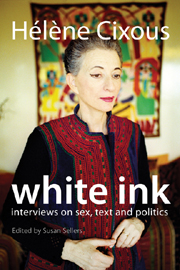Book contents
- Frontmatter
- Contents
- Acknowledgements
- Editor's note
- Preface: On being interviewed
- Part I Writing the enigma
- Part II Writing the feminine
- Part III Writing and politics
- Part IV Writing and theatre
- 9 The author between text and theatre
- Part V Writing roots
- Part VI On painting, music and nature
- Part VII Dialogues
- Envoi: But the Earth still turns, and not as badly as all that
- Bibliography of Hélène Cixous's works
- Index
9 - The author between text and theatre
from Part IV - Writing and theatre
- Frontmatter
- Contents
- Acknowledgements
- Editor's note
- Preface: On being interviewed
- Part I Writing the enigma
- Part II Writing the feminine
- Part III Writing and politics
- Part IV Writing and theatre
- 9 The author between text and theatre
- Part V Writing roots
- Part VI On painting, music and nature
- Part VII Dialogues
- Envoi: But the Earth still turns, and not as badly as all that
- Bibliography of Hélène Cixous's works
- Index
Summary
This interview first appeared as “L'auteur entre texte et théâtre”, in Hors Cadre, vol. 8, “L'Etat d'auteur” [State of the Author], 33–65, 1990.
cixous It's best if I attempt something like an account of (my) theatrical writing.
An account, because I won't be theorizing, except where certain aspects that I'll be talking to you about are concerned; for example, the question of the characters, which I think is essential.
The fact is that writing remains a solitary process. When I write for the theatre, I write in my corner, like for fiction, but positioning myself differently in relation to the text that emerges from the Théâtre du Soleil. Here I'm referring specifically to my relationship with the Théâtre du Soleil, not to my relationship with theatre more generally. For example, this year I wrote a play intended for X. In that instance, I was the one giving the orders; it was my fantasy, my desire, and didn't come from anyone other than myself. It was a play for five women. With the Théâtre du Soleil, it's completely different because there's a commission and I'm the one taking orders.
The commission already dictates certain characteristics; not of the writing itself, but of the economy of the play. For example — a certain length, a certain breadth, a certain scope and a certain quantity. There are twenty-five or thirty actors in the Théâtre du Soleil.
- Type
- Chapter
- Information
- White InkInterviews on Sex, Text and Politics, pp. 97 - 124Publisher: Acumen PublishingPrint publication year: 2008



